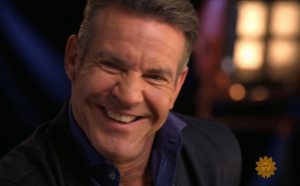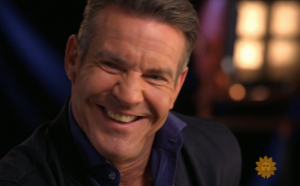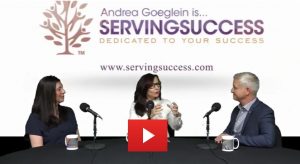By Andrea Goeglein

“An overwhelming capacity for rejection,” is the answer actor Dennis Quaid gave to CBS’ Sunday Morning when asked why he was still relevant as an actor when many of his peers had faded from view.
I was struck by Quaid’s answer because it was not focused on the positive attribute of building resilience. His answer, at first blush, was focused on building a capacity for what he didn’t want: rejection. Then it made perfect sense. Building a capacity for rejection requires you to build resilience into your natural operating system. Resiliency is not something you wait to build after a negative event. Instead, by focusing on building a capacity for rejection, you are teaching yourself to be resilient in the moment, allowing you to rebound quicker, and getting back to being focused on the goal at hand.
Sharon Adeshek and I recently had an opportunity to speak with retired Col. Steve Seroka about his career transition from a successful 30-year career in the Air Force to civilian life. I am proud to announce that Steve is putting what he learned throughout his life experiences to work as the President of Disabled Veterans Business Alliance AND he is running for Las Vegas City Council Ward 2.
See if you can identify some of Steve’s potential negative beliefs and how he overcame them to achieve his next level of great successes. Then work the exercises that follow to put all these pieces together for your next great success.
How do you build resilience into your natural day-to-day life operating system? Start with these steps that build psychological fitness (the following is adapted from the book Flourish by Martin E. P. Seligman pp 167-168):
1. Fact: You cannot solve a problem if you do not work on the correct cause of the problem. Apply the ABCDE model to all apparent adversities.* A given adversity does NOT cause negative thoughts and emotions. Your BELIEF about the adversity (which is established long before it happens) causes the negative emotional consequences.
Example: You are having a challenging time finding a new position after leaving a long-term job. You think you are feeling down because you cannot find a new career situation. In reality, you had planted some negative beliefs long before you left your prior career establishing it would be challenging to find a new, inspiring opportunity. “I better not lose this job because jobs are hard to find.” “I was trained by one company in their way of doing things. Other companies don’t care about what I know.” “It is difficult to transition from a military career to the civilian sector successfully.”
The goal of the exercise is to discover the belief you had before the adversity occurred and activity work to transform the belief with your language about the belief.
2. Make a list of how often you view a current adversity as the real problem. You are looking for a pattern in your daily thinking. Look for broad generalizations that you have unknowingly come to live by. “If an employee does not get it right the first time, they are going to be more trouble than they are worth.” “If I spell a word wrong in this presentation, my boss will think I am dumb and not think of me for other projects.” “People who speak with an accent are too hard to understand.”
3. Once you have found one example of a limiting belief, make a list of as many of those beliefs you hold as you can. You are attempting to uncover as many pre-set negative beliefs about your ability to be successful as possible. Don’t be surprised if such thoughts include, “My Mother always told me I was not good at math,” and “My third-grade teacher said I would never be successful because I ask too many questions.”
By activity choosing to work on your thought patterns before a problem arises will build your capacity for rejection.
*Contact me if you want a worksheet for the ABCDE exercise at DrSuccess@SevingSuccess.com



